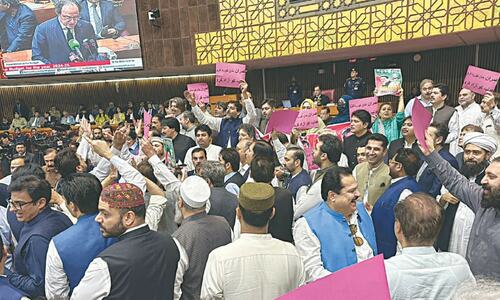PRIME Minister Nawaz Sharif may have made a historic visit to North Waziristan Agency yesterday, but optics and words of encouragement for the troops aside, what is the civilian government’s input on Fata?
A day earlier, army chief Gen Raheel Sharif perhaps unwittingly played up the contrast between the military’s eagerness to be seen to be doing something for the social and economic uplift of Fata and the civilian government’s near-total apathy.
Gen Sharif’s announcement that the army will, in token numbers, recruit soldiers from Fata and induct Fata schoolchildren and young adults into army-run schools and technical training institutes will not fundamentally alter the region’s socio-economic and security landscape. But that is not the point since the army cannot on its own transform the socio-economic and security realities of Fata nor does it have the resources to do so.
What Gen Sharif’s announcement did underline, however, was that at least the army leadership is thinking about matters in terms of the aftermath of the military operations, while all the prime minister’s visit did was to underscore that the civilians are not even attempting to think about Fata and what it will take to bring peace, stability and, eventually, prosperity and national inclusivity to the war-torn region.
Clearly, launching Operation Zarb-i-Azb in North Waziristan was not the preferred choice, possibly not even the decision, of the prime minister. Also, with nearly 200,000 troops estimated to be deployed in Fata and military operations ongoing in several areas as security remains elusive, the space for the civilians to help steer the Fata policy is not large. And all of that before even taking into consideration the troubled state of overall civil-military relations.
Yet, an honest appraisal of the situation in Fata will have to confront the reality that the country’s civilian leadership, be it the previous elected government or the present one, does not really understand the complexities of the tribal areas nor is it particularly keen on developing ideas about what to do with the region — even if it had the space in the civil-military domain to do so.
Surely though, Fata will never be stabilised and put on a firm, irreversible path to peace if military strategy — and the military itself — drives all policy. Set aside for a minute even the concerns about whether the security establishment has truly abandoned its good militant/bad militant policy and operational distinction.
No army — not even the best intentioned and resourced — is trained to revive and invigorate in socio-economic terms a region ravaged by war. That is a role for the civilian leadership. The army leadership may often shove aside civilians, but simply surrendering, washing their hands of policy issues and sulking isn’t the way to recover the rightful space the civilians should have. The prime minister and his party need to do better, much better.
Published in Dawn, October 10th, 2014










































